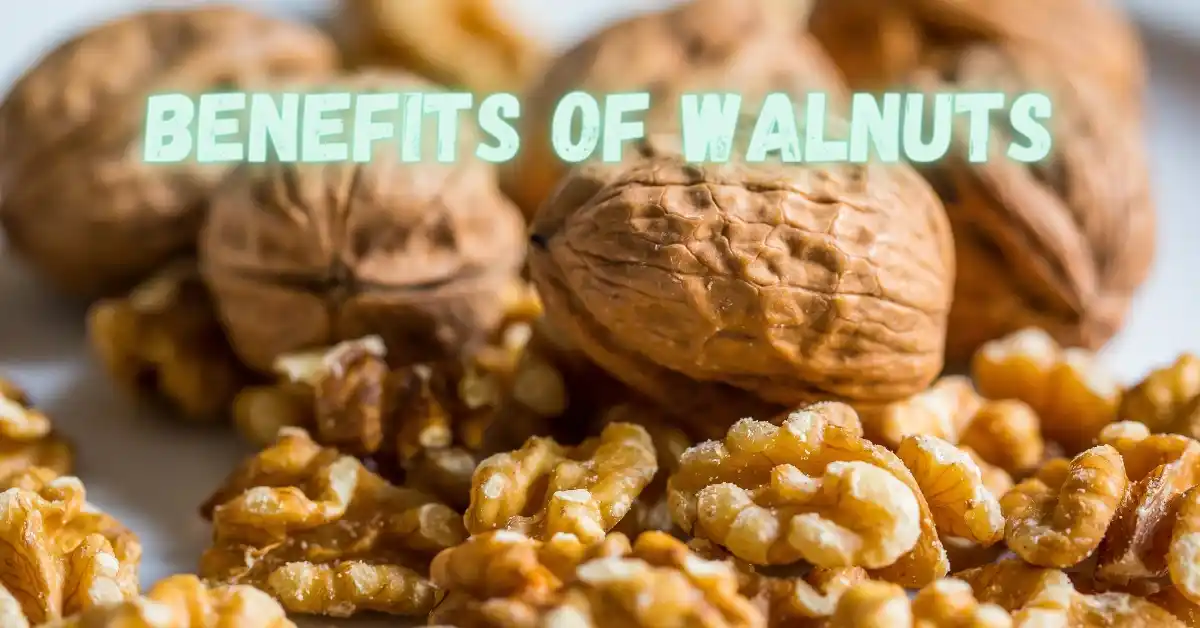Introduction
Nuts are absolute powerhouses of health, packed with beneficial compounds and vitamins. These nutritious foods are essential for overall well-being and can boost brain power and support a healthy heart. Walnuts, like crunchy superheroes, provide the body with the nourishment it craves. In today’s fast-paced, modern world, it’s easy to overlook the importance of a balanced diet, but walnuts play a vital role in maintaining overall health. Stocking up on walnuts can lead to a healthier lifestyle and improved overall health. Lets talk about benefits of walnuts.
How to eat walnut
Walnuts are not only tasty, but also highly healthy. Check out these awesome ways to make the most of them!
- As a Snack:
- Raw walnuts are a fantastic snack. Grab a handful (approximately an ounce) and enjoy the natural flavor and crunch.
- You may also combine them with other nuts or dried fruits to make a tasty trail mix.
- In Breakfast:
- Sprinkle walnuts over your breakfast oatmeal or other hot or cold cereal.
- Mix them into pancakes, muffins, or other quick bread recipes to add texture and taste.
- Salads and Vegetables:
- Toss walnuts with your favorite veggies or mix them into salads. They have a delicious crunchy and nutty flavor.
- They may also be used as a topping on roasted vegetables.
- Baking and Cooking:
- Mix walnuts into your baking. Add them to cookies, brownies, or banana bread for an additional rich flavor.
- Use ground walnuts as a protein topping in savory recipes. They provide crunch, taste, and beneficial fats.
Remember, walnuts are adaptable, so feel free to explore and discover your favorite ways to eat them!
How many walnuts to eat per day
The recommended daily consumption of walnuts varies widely depending on the source; nonetheless, below are some guidelines:
- Optimal Amount: Consuming 1-2 ounces (30-60 grams) of walnuts per day is regarded as the ideal quantity to include their nutritious advantages into your diet. This quantity is linked to a decreased risk of heart disease, greater cognitive function, and better overall health.
- Caloric Density: Keep in mind that walnuts are high in calories, so limit your intake. A serving of walnuts is approximately 1 ounce (¼ cup). However, other research show that eating 1.5 to 2 ounces of walnuts may be useful for reaping the health advantages they provide.
- Daily Recommendation: To reap the various health advantages of walnuts, aim for a handful (about 7-10 walnuts) per day. This quantity provides a decent nutritional balance while avoiding extra calories.
Remember that moderation is essential, and including walnuts into your diet may be a delightful way to boost your overall health!

Benefits of walnuts for male
Walnuts have several health benefits, particularly for males. Here are some reasons why you might wish to incorporate walnuts into your diet:
- Improved Semen Quality: Consuming 75g of walnuts per day has been shown to improve semen quality. So, if you want to improve your reproductive health, walnuts might be an excellent choice.
- Lower LDL Cholesterol: In a six-week research including active senior men, simply 15g of walnuts per day, paired with a modest exercise plan, reduced bad LDL cholesterol by up to one-fifth.
- Testosterone Boost: Walnuts might boost testosterone levels by up to 10%. This testosterone increase promotes bone density, muscular mass, and sex desire.
- Heart Health: Did you know that walnuts are packed with healthy fats, especially omega-3 fatty acids. These fats are favorable to heart health and can help reduce the risk of cardiovascular disease.
- Brain Function: The minerals in walnuts promote brain health and may help your brain work properly as you age.
- Antioxidants: Walnuts contain polyphenols, which have antioxidant effects. These substances serve to protect your cells from oxidative damage.
- Gut Health: Walnuts include vital minerals and antioxidants that help improve intestinal health.
Remember, walnuts are adaptable and may be eaten in a variety of ways. Here are a few ideas:
- Energy Balls: Combine walnuts, oats, maple syrup, dates, and a sprinkle of salt. Roll into balls and store in the refrigerator for fast glycogen replacement.
- Crunchy Pesto: Replace pine nuts with walnuts and season with garlic, basil, parmesan, and oil. Basil contains anti-inflammatory characteristics that might help you recuperate quicker after the gym.
- Brussels Sprouts: Blanch the sprouts, then saute the pancetta in a skillet and toast the walnuts. Brussels sprouts are high in glucosinolates, which can boost muscular growth.
Feel free to integrate walnuts into your diet and reap the countless health advantages!
Sexual benefits of walnuts
Walnuts may offer a variety of sexual health advantages, including
Sperm health: A 2012 study discovered that males who consumed 2.5 oz (75 g) of walnuts per day for three months had better sperm morphology, motility, and vitality.
Erectile function: Walnuts may aid with erectile dysfunction by promoting blood vessel dilation and contraction.
Sexual desire: A research published in the journal Nutrients discovered that include walnuts in a Western diet might boost sexual desire. Another research discovered that males who consumed a nut combination consisting of 50% walnuts, 25% almonds, and 25% hazelnuts for more than 14 weeks had a substantial increase in sexual desire and orgasmic performance.
Walnuts also include vitamins B1, B2, A, E, and F, which may enhance their sexual health advantages.

Benefits of walnuts for female
Walnuts are a modest but powerful food that may greatly benefit a woman’s health. Let’s look at some of the benefits that are particularly important to women:
- Breast Health: Walnuts include antioxidants and good fats, which may benefit breast health. While additional study is needed, incorporating walnuts in your diet may improve overall breast health.
- Aging: The antioxidants in walnuts assist to combat oxidative stress, which is linked to aging. Including walnuts in your diet may promote healthy aging and protect against age-related disorders.
- Mental Health: Walnuts have high levels of omega-3 fatty acids, which are essential for brain function. Walnuts may aid boost memory, mood, and cognitive performance.
- Reproductive Health: Walnuts include critical nutrients such as folate, which is necessary for reproductive health. Folate is essential throughout pregnancy to avoid birth abnormalities and promote fetal growth.
- Heart Health: Walnuts’ omega-3 fats can help lessen the risk of heart disease, a significant cause of mortality among women. Walnuts may help improve heart health when consumed on a regular basis.
- Gut Health: Walnuts include fiber and helpful chemicals that help maintain a healthy gut microbiome. Keeping your gut microbiota in harmony is essential for your overall health and vitality.
Remember that walnuts are flexible and may be simply included in your diet. They can be eaten as snacks, mixed into salads and porridge, or baked. Enjoy the many health advantages of walnuts!

Benefits of walnuts for skin
Walnuts have several skin advantages. Let’s look at how they can improve your skin health.
- Fights Wrinkles, Dark Circles, and Acne:
- Walnut oil is a wonderful skin-enhancing ingredient that may help treat acne, wrinkles, and dark spots.
- Walnuts contain significant levels of antioxidants and vitamins, which help:
- Tighten skin pores.
- Remove hyperpigmentation.
- Reduce acne.
- To help reduce dark circles, rub a few drops of walnut oil beneath your eyes on a daily basis.
- Apply 3-4 drops of walnut face oil before sleep to keep your skin nourished and treat acne or wrinkles.
- Exfoliates Skin:
- Walnuts’ texture and vitamin E content make them a good skin exfoliator.
- Walnut face scrubs help to cleanse your pores and remove extra debris, dead skin cells, and grime from the skin’s surface.
- Brightens Complexion:
- Vitamin E and B6 are necessary for good skin.
- They help:
- Clear dirt and debris from skin pores.
- Reduce dark spots, suntan, and acne scars.
- Hydrate your skin, resulting in a naturally radiant and soft complexion.
- Moisturizes the Skin:
- Walnut oil’s vital fatty acids promote blood circulation and keep you hydrated.
- These fatty acids help seal moisture into the skin, keeping it moisturized.
- Works as an Antioxidant:
- Walnuts are a great source of antioxidants.
- Their polyphenols protect the skin from free radical damage, reducing premature aging, hyperpigmentation, and acne scarring.
Remember to consume all products in moderation, including walnuts and walnut oil. Enjoy the advantages of walnuts on your skin!

Benefits of walnuts for brain
Walnuts are an absolute powerhouse when it comes to brain health. Let’s look at why these brain-shaped nuts are so fascinating.
- Omega-3 Fatty Acids: Walnuts are high in alpha-linolenic acid (ALA), a plant-derived omega-3 fatty acid. Omega-3 fatty acids are important brain nutrients that may protect against oxidative stress and inflammation, both of which contribute to cognitive loss.
- Polyphenols: Walnuts have more polyphenols than any other nut. These chemicals also improve brain function by lowering oxidative stress and inflammation.
- Heart-Healthy Benefits: While most nuts are considered heart-healthy, the American Heart Association has designated walnuts as Heart-Check Certified. They assist to lower “bad cholesterol” (LDL cholesterol), which can contribute to atherosclerosis and raise the risk of a stroke or heart attack over time.
- Memory and Brain Function: Animal and human studies have demonstrated that eating walnuts improves memory and brain function. Snacking on a dish (or two) of walnuts may help decrease inflammation and provide antioxidant protection.
- Antioxidant and Anti-Inflammatory Properties: Walnuts include omega-3 fatty acids, polyphenols, and other nutrients that help protect brain cells from oxidative stress and inflammation, boosting general brain health.
Including walnuts in your diet might be a great approach to improve brain function. Walnuts have several health advantages, whether eaten as a snack or added to salads, oatmeal, or baked products.
Benefits of walnuts for hair
Walnuts are not only a delicious snack, but they are also an excellent source of nutrients for your hair. They include a wide range of vitamins, minerals, and healthy fats that encourage hair development and strength. Let’s look at the benefits of walnuts for your hair.
- Fights Dandruff:
- Walnut oil has antioxidant and antibacterial effects.
- It cleanses the scalp and removes fungal diseases and dandruff.
- Furthermore, its anti-inflammatory properties can alleviate itching and scalp irritation.
- Promotes Hair Growth:
- Walnuts are high in antioxidants including catechins, essential fatty acids, and protein.
- They’re also high in zinc, iron, and copper.
- Walnuts’ rich content promotes hair development and dramatically enhances hair quality.
- Reduces Hair Loss:
- Walnuts include numerous minerals that are essential for hair development and strength, including iron, selenium, copper, and zinc.
- These nutrients assist to prevent hair loss and increase hair thickness and strength.
- Strengthens and Nourishes Hair:
- Walnuts include omega-3, omega-6, and omega-9 fatty acids, which aid to strengthen your hair.
- They also condition your hair by preventing water loss, resulting in soft and smooth locks.
- Essential fatty acids also aid to prevent dryness and hair damage caused by sun exposure or pollution.
- Supports Scalp Health:
- Walnuts are rich in protein, vital fatty acids, iron, and calcium.
- They also have antioxidant and antibacterial qualities, which nourish your scalp and improve blood circulation to your hair.
- Makes Hair Shiny:
- Walnuts are high in keratin, which adds natural luster and strength to your hair.
- Regularly using walnut oil or utilizing walnut-based hair packs will help your hair become stronger, shinier, and softer.
- Prevents Premature Graying of Hair:
- Walnuts are a natural source of melatonin, a hormone that contributes to the color of your hair.
- Regular usage of walnut oil and consumption of walnuts can help prevent graying of the hair.
- Averts Hair Thinning:
- Walnut oil includes calcium, iron, copper, omega-3 fatty acids, and zinc.
- Each of these nutrients contributes significantly to hair growth and strength.
Incorporating walnuts into your diet and hair care regimen will help your hair become healthier and more bright!

Eat walnuts during pregnancy
Walnuts are a healthy option during pregnancy, providing several advantages to both you and your baby. Here’s why you might want to include walnuts in your diet.
- Brain and Eye Development: Walnuts contain high levels of folate and the omega-3 fatty acid alpha-linolenic acid (ALA). These nutrients are essential for your baby’s normal brain and eye development. Folate helps to minimize birth abnormalities and problems, thus walnuts are a wonderful supplement early in pregnancy.
- Blood Pressure and Blood Sugar Control: Walnuts used on a regular basis may help reduce high blood pressure and blood sugar levels. Their beneficial fats, antioxidants, and other plant ingredients promote general wellness. Managing blood pressure and blood sugar levels can help lower the risk of gestational diabetes and high blood pressure during pregnancy.
- Healthy Weight Gain: While weight gain is natural during pregnancy, it is critical to do it in a healthy manner. Walnuts can help regulate weight gain by reducing blood sugar surges and increasing satiety. They’re also an excellent snack for satisfying sugar cravings and limiting extra sugar intake.
- Immune System Support: During pregnancy, your immune system becomes somewhat inhibited. Consuming foods like walnuts can help your immune system fight infections and viruses.
- Nutrient-Rich: Walnuts are rich in protein, fiber, and important vitamins and minerals. They help healthy digestion and regularity, which are important during pregnancy.
Remember to consume walnuts in moderation—about 30 grams (about 1 ounce) each day—to reap the benefits without exceeding your calorie intake. Always check your healthcare professional to determine that walnuts are appropriate for your specific nutritional needs during pregnancy.
Overall health benefits
Heart Health Benefits:
- Walnuts are rich in omega-3 fatty acids, particularly alpha-linolenic acid (ALA), which reduce the risk of heart disease by lowering LDL cholesterol and preventing plaque buildup in arteries.
- Walnuts are rich in polyphenols and phytochemicals, which help manage cholesterol levels and support cardiovascular function.
- A study found that individuals who consumed walnuts had a lower risk of developing heart disease compared to those who didn’t.
Brain Function Benefits:
- Walnuts are essential for optimal brain function, supporting cognitive processes like memory, focus, and information processing.
- They can help maintain healthy brain structure and support cognitive processes like memory, focus, and information processing.
Weight Management Benefits:
- Walnuts are high in calories but their unique nutritional profile makes them an effective ally in weight management efforts.
- They promote feelings of satiety, helping to stay fuller for longer and potentially reducing the temptation to indulge in unhealthy snacking.
- Walnuts may also boost metabolism by optimizing nutrient utilization and energy expenditure.
Anti-Inflammatory Properties:
- Walnuts have anti-inflammatory compounds that work together to combat oxidative stress and excessive inflammation in the body.
- These properties may even have implications for mood regulation.
Enhanced Male Fertility Benefits:
- Walnuts can positively influence sperm health, motility, and viability.
Gut Health and Digestion Support:
- Walnuts are an excellent source of dietary fiber, which plays a vital role in maintaining a healthy digestive tract.
- The diverse array of nutrients found in walnuts also nourish the gut microbiome, essential for optimal digestive function, immune system regulation, and mental health.
Potential Cancer-Fighting Properties:
- Walnuts are rich in antioxidants, including polyphenols and phytochemicals, which have been shown to exhibit anti-cancer effects by neutralizing harmful free radicals and reducing oxidative stress.
- Studies have found that women who consumed at least two servings of walnuts per week had a significantly lower risk of developing breast cancer.
Comprehensive Nutrient Profile of Walnuts:
- Omega-3 Fatty Acids: Walnuts are rich in alpha-linolenic acid (ALA), a type of omega-3 linked to improved heart health, brain function, and reduced inflammation.
- Essential Vitamins and Minerals: Walnuts are rich in Vitamin E, Vitamin B6, Copper, Manganese, and Magnesium, all crucial for nerve function, energy metabolism, and immune system health.
- Plant-Based Protein and Fiber: Walnuts provide plant-based protein and fiber, crucial for tissue repair and digestive health.
- Overall, walnuts are a one-stop-shop for essential nutrients in a convenient, tasty package.
Healthy Aging and Longevity with Walnuts:
- Walnuts can promote healthy aging and potentially increase longevity.
- Walnuts have antioxidant and anti-inflammatory properties, helping combat oxidative stress and inflammation, which can lead to age-related diseases and cognitive decline.
- Walnuts are rich in nutrients like vitamin E and omega-3 fatty acids, which support cellular health and integrity.
- These nutrients can slow down aging and reduce the risk of age-related diseases like cognitive decline, heart disease, and certain types of cancer.
Side effects of walnuts
Walnuts are healthful and adaptable, but they may have some unintended consequences for your health. Let’s look at both the good and probable harmful effects of eating walnuts.
- Lower Cholesterol:
- Regular walnut eating has been related to long-term decreased cholesterol levels. Research indicated that eating walnuts for two years improved cholesterol profiles in healthy older persons.
- Longevity Boost:
- If you want to live a longer life, consider adding walnuts. According to research, older persons in the United States who consume more walnuts have a decreased risk of mortality and a longer life expectancy.
- Iron Absorption Interference:
- Walnuts may inhibit the absorption of iron. If you are taking an iron supplement or eating iron-rich meals, avoid eating walnuts at the same time.
- Digestive Issues:
- Overeating walnuts can cause stomach cramps, gas, and bloating. If you are allergic or intolerant to walnuts, you may have nausea or diarrhea.
- Allergic Reactions:
- Some people may be allergic to nuts and get rashes and swelling all over their bodies after eating too many walnuts.
- Weight Gain and Choking Risk in Children:
- Overconsumption of walnuts can cause weight gain.
- Parents should use caution since whole walnuts can be a choking hazard for young children.
Remember, moderation is crucial. To get the advantages of walnuts without suffering any negative consequences, it is typically suggested that you consume no more than an ounce (about 30 grams) every day.
Conclusion
Walnuts are true powerhouses in health, promoting heart health, brain function, weight management, and healthy aging. They are easy to incorporate into your diet, whether sprinkled over oatmeal, salads, or snacked on throughout the day. These nutritional gems are a delicious and convenient way to nourish your body from the inside out, providing numerous health benefits that your body and taste buds will appreciate.
FAQs:
Are walnuts high in calories? Isn't that bad for weight loss?
While walnuts are calorie-dense, their unique nutrient profile can actually aid in weight management efforts. Feeling full and satisfied is easier with walnuts! Packed with healthy fats, fiber, and protein, walnuts can help you eat fewer calories while still feeling satisfied. Additionally, walnuts may support a healthy metabolism, further contributing to weight management goals.
Is it safe to eat walnuts if I have a nut allergy?
If you have a diagnosed tree nut allergy, it's best to avoid walnuts entirely. Walnuts are tree nuts, and consuming them could trigger an allergic reaction ranging from mild to severe. Always consult with your healthcare provider or allergist before introducing new foods if you have known allergies.
How many walnuts should I eat per day to experience the health benefits?
While there's no definitive daily recommended amount, many experts suggest consuming around 1-2 ounces (or about 14-28 walnut halves) per day to reap the health benefits. However, it's important to remember that moderation is key, as walnuts are still high in calories. Incorporate them into your diet as part of a balanced, nutrient-dense eating plan.
Do walnuts interact with any medications?
Walnuts are generally safe for most people, but there is a potential for interaction with certain medications, such as blood thinners (anticoagulants) and anti-platelet drugs. The high omega-3 content in walnuts may increase the risk of bruising or bleeding when combined with these medications. If you're taking any prescription drugs, it's best to consult with your healthcare provider before adding walnuts to your diet.
Are there any specific health conditions that could benefit from walnut consumption?
While walnuts offer a wide range of health benefits, some specific conditions that may benefit from their nutritional profile include heart disease, cognitive decline, diabetes, certain types of cancer, and inflammatory disorders. However, it's important to note that walnuts should be consumed as part of a balanced, healthy diet and not treated as a sole cure for any medical condition.





